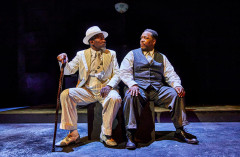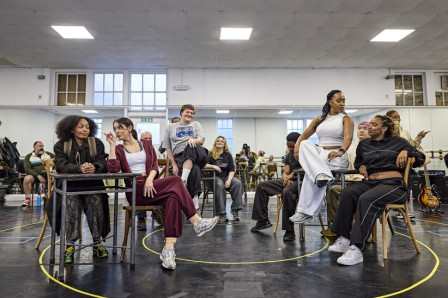Review: DEATH OF A SALESMAN at The Young Vic
 Following the huge success of the gender reversed Sondheim's COMPANY, Marianne Elliott, together with Miranda Cromwell directs Arthur Miller's 1949 classic DEATH OF A SALESMAN. This co-production between the Young Vic and Elliot’s company Elliott & Harper Productions offers a fresh interpretation of a well-known text, as it sets out to put 1940's African American experience centre stage.
Following the huge success of the gender reversed Sondheim's COMPANY, Marianne Elliott, together with Miranda Cromwell directs Arthur Miller's 1949 classic DEATH OF A SALESMAN. This co-production between the Young Vic and Elliot’s company Elliott & Harper Productions offers a fresh interpretation of a well-known text, as it sets out to put 1940's African American experience centre stage.
Willy Loman (Wendell Pierce) is tired. He's been on the road for far too long. His wife Linda (Sharon D. Clarke) is always there, awaiting his return from his work travels. You see it's not only Willy's job that tires him but also his constant chase for the American dream. But Willy’s sons, womanizer Happy (Martins Imhangbe) and the once proclaimed to be a real football star Biff (Arinzé Kene) are a constant reminder of the dream that never became real.
There’s a sense of grandness around this production, especially when it comes to the set. Anna Fleischle’s design is very effective in the way it supports the rhythm of the piece, especially in the first half as Loman’s house is created in front of us, room by room, moment by moment. Composer and Musical Director Femi Temowo aces at executing sequences of theatrical magic by creating eerie and breath-taking moments that create a strong contrast to the more naturalistic style of the piece.
Without a doubt the superb cast is the strongest aspect of the whole production. Wendell Pierce brings a lot of vulnerability to the role of Willy and as the show progresses you begin to see just how contemporary the characters seem. Sharon D. Clarke’s tenderness in Linda really defines the relationship of the Loman family. It is during the heated arguments between the father and his sons that we get a glimpse of the gender politics within this household and see the nastier and toxic side of Willy. Martins Imhangbe gives a great amount of youthful confidence to Happy, whilst Arinzé Kene is absolutely mind blowing as the reclusive Biff. The rest of the cast provides a strong support for the main actors, often doubling up, and Trevor Cooper is particularly good as Willy’s friend Charley.
When this production was first announced, I was really thrilled about the potential of its conscious casting. In Elliott’s and Cromwell’s production this additional layer of the socio-political context provides a fresher and more nuanced understanding of Willy’s struggle for acceptance and greatness. The fear of being rejected is no longer just that, but the fear for one’s dignity and life. Yet I think there is a space for more here and at times DEATH OF A SALESMAN feels like a production of lost opportunities in terms of directorial choices. Elliott’s direction is slick and admirable, yet it lacks the freshness that this new interpretation creates. Whilst the theatricality of the piece works at certain moments it also brings the pace down and creates a sense of detachment for the audience. At no point during this three hour spectacle am I not hyperaware that I am in a theatre watching a very skilfully directed play.
I would not be surprised if this production of DEATH OF A SALESMAN will transfer to the West End. It is a big, glossy and well-crafted piece of theatre starring some of the most talented people out there, but it is also a production that only partially attempts to break away from the conventional.
Latest News

 Review: GRINDR MOM at Waterloo East Theatre
21 February 2026 at 11:24
Review: GRINDR MOM at Waterloo East Theatre
21 February 2026 at 11:24

 TV & Film-inspired theatre shows to see in London
20 February 2026 at 17:39
TV & Film-inspired theatre shows to see in London
20 February 2026 at 17:39

 Cast and creatives announced for HEART WALL at Bush Theatre
19 February 2026 at 15:53
Cast and creatives announced for HEART WALL at Bush Theatre
19 February 2026 at 15:53

 Rehearsal images released of new West End cast of HADESTOWN
19 February 2026 at 12:22
Rehearsal images released of new West End cast of HADESTOWN
19 February 2026 at 12:22
